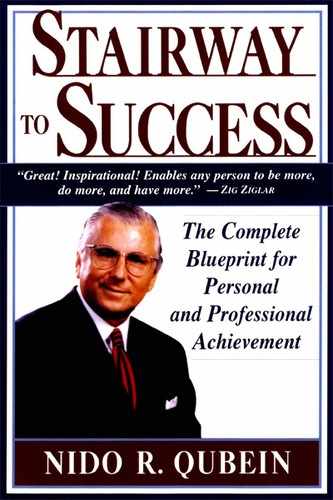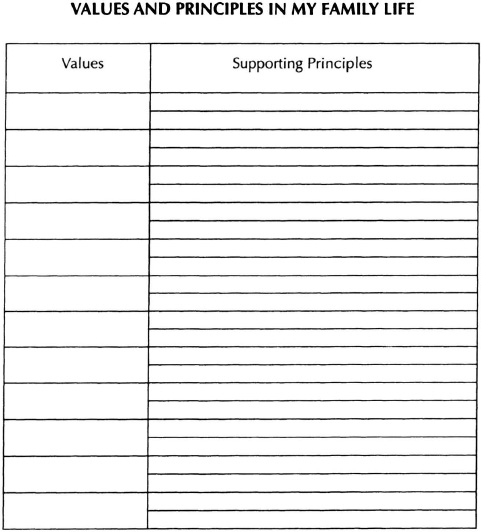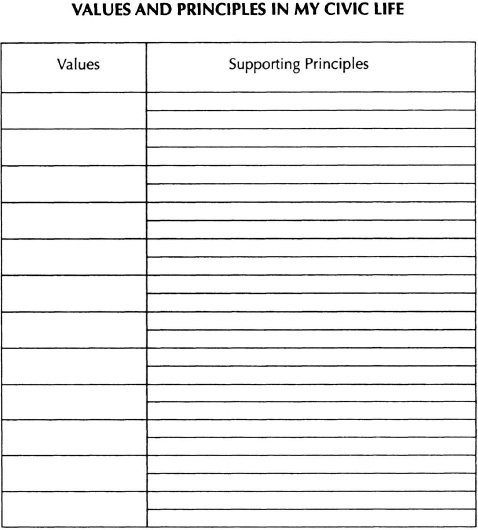3
WHAT VALUES ARE IMPORTANT TO YOU?
We may be personally defeated, but our principles never.
—WILLIAM LLOYD GARRISON
So far you’ve learned how to identify your congenial competencies, your compatible careers, and your congenial roles. In other words, your career choices can now be guided by:
- the things you like to do
- the things you do best
- your preferred behavioral mode
But true success goes far beyond a career choice. History books and entertainment magazines are full of examples of people whose careers soared while their lives crashed—even as they were doing the things they enjoyed and did best. This can happen if your behavior is not in line with rules of conduct based on a set of principles grounded in positive personal values.
THE IMPORTANCE OF VALUES AND PRINCIPLES
Don’t worry. I’m not going to give you a set of rules to tell you what you can and can’t do with your life. But you can write your own rules of conduct, based on the principles you choose and the values you cherish.
Let’s stop to define what we mean.
A value is something you hold dear, whether it be a person, an activity, a material object, or a quality. A principle is a broad, fundamental truth. A rule of conduct is a guide to behavior designed to implement a principle.
For example, human life is a value. “It is wrong to take human life deliberately and maliciously” is a principle. “Thou shalt not commit murder” is a rule of conduct.
The principle supports the value; the rule implements the principle.
Different people value different things. You may view some values as negative and some as positive. Some people value generosity, kindness, and decency. Others value greed, violence, and obscenity. What you value determines the principles by which you measure your behavior.
Sound principles are based on your rock-bottom assessment of what is right. They represent your perception of the way things ought to be in relation to your values. If you want to be truly happy, direct your efforts toward bringing your life into harmony with your principles, the way you believe things ought to be.
All the talent in the world will not bring you happiness if it is not applied in harmony with your perception of the way things should be. Applying your talents without reference to your values and principles is like using your car’s accelerator without touching the steering wheel. It may take you far and fast, but it probably won’t take you where you want to go. And it may take you over a cliff or into a brick wall.
WHAT’S IMPORTANT TO YOU?
Most of us see life like a split image viewed through the focusing lens of a camera. One image represents reality: the way things are. The other represents our principles: the way things ought to be. Successful people bring their lives into focus by merging the two images, as shown in Figure 3-1. When we perceive that things are as we think they ought to be, our lives are in harmony.
Merging the two images means much more than finding the right career. It involves the whole spectrum of your life’s activities. To become truly successful, you must examine your life in all its aspects and determine what things are important to you, what things are worthy of your energy and your attention, and what values will motivate you to put forth your maximum efforts.
For many people, a career is the value at the center of their lives. Everything they do revolves around the job. It becomes their core motivation. For others, a career is a means to an end. Its role is to provide them with the financial ability to do the things that are really important to them. Their core motivations lie outside their careers.
Your core motivation springs from the values you deem to be most important. No one can tell you what values you should put first in your life. That’s a conclusion that you must reach yourself. It’s a conclusion that will guide your most vigorous efforts. We tend to expend the most time and energy on the things we consider the most important.
CONSCIOUS AND UNCONSCIOUS CHOICES
The choice between what’s important and what’s unimportant in your life can be made either consciously or unconsciously.
The husband and father who spends most of his time in front of a television, ignoring the activities of his household and neglecting the training of his children, may not have consciously decided that the tube is more important than his wife and family, but the choice has been made unconsciously. And to him, television is important.
The woman who spends her bonus on an expensive new sports car instead of investing it in a retirement fund may not have made a conscious decision to value material possessions ahead of financial security, but she has indeed decided that present pleasures are more important to her than future comfort.
People whose reading habits tend toward romance novels, sports magazines, and horoscopes to the exclusion of self-help books, professional journals, and business publications may not have consciously decided that leisure-time pleasures are more important than their careers, but their activities indicate that the decisions have been made.
A few people have followed unconscious choices to spectacular success—simply because their choices happened to place them in the right places at the right times. Others have meandered through life pursuing whatever passion or diversion occupied the place of importance at the moment and have ended up going nowhere. Unconscious choices put you at the mercy of the dice roll.
The Wizard and the Stable Hand or Letting Life Choose for You
I once heard a story about an old peasant in medieval times who served as a stable hand on a nobleman’s estate. One day a wizard happened by and watched him laboring away.
“Is a stable hand all you were meant to be?” the wizard asked.
“I don’t rightly know,” said the old man.
“I have the power to turn you into whatever you’d like to become,” said the wizard. “Make up your mind, and when I come by again in a couple of weeks I’ll grant your wish.”
The stable hand decided that the easiest way to know what he would like to be was to wander around the estate, observing people and noting those he felt most drawn to.
He felt no great attraction toward the miller or the cobbler or even toward the nobleman and his family. The miller’s job was too strenuous; the old man didn’t like the idea of lifting all those bags of grain and flour. The cobbler’s job required too many skills; the peasant didn’t want to expend the time and effort to acquire them. And he didn’t care for the weighty responsibilities that burdened the nobleman.
Finally he happened across a peasant woman rocking her baby in front of her cottage. He felt a strong attachment for the baby.
So when the wizard returned two weeks later, the old man told him, “I want to be a baby.”
The wizard granted his wish.
Fifty years later, the wizard, being gifted with immortality, happened past the same bam. And there he saw the same old peasant cleaning out the stable.
Instead of proactively deciding what he wanted to become, the stable hand had unconciously left it to fate. And what he got was predictable.
Don’t Drift into a Choice
You don’t have to drift into an unconscious choice of core motivation. You can consciously decide what values you choose to make the center of your life. You can arrange your values in order of priority and allocate your time and energy on the basis of these choices.
Remember that your core value is what you place at the center of your life. It will govern the direction in which you expend your most vigorous efforts.
Your core value may be people, possessions, activities, or principles. It may be strong or weak and it may be conscious or unconscious, but everybody has one.
The Person-Centered Life
Those who put people at the center of their lives are governed by the needs of others.
We’ve all known parents who’ve focused their entire lives on doing things for their children or grandchildren. We’ve known wives and husbands who’ve devoted their principal energies to making their spouses happy. We’ve known people who’ve expended their lives promoting the interests of a politician or a religious figure. We’ve even known people who’ve spent all their resources following entertainment or sports idols on their tours.
When you empower another person in this way, you disempower yourself. You are taking away from yourself the power of independent decision making and placing all your decisions, directly or indirectly, in the hands of that other person.
In extreme cases, we see the spouses or offspring of people with substance-abuse or emotional problems centering their lives on the person with the problem. They try to compensate for the other person’s behavior by modifying their own. They weigh each aspect of their conduct in the light of its possible effect on the behavior of the dysfunctional person. Such behavior has a label: co-dependency. It not only is ineffective in helping the person with the problem; it also destroys the lives of the co-dependents.
You can also put people at the core of your motivation by making them the objects of your hatred. The movie Amadeus portrayed the destructiveness of this type of obsession in the case of the envious musician who devoted his life to sabotaging the career of Mozart.
The Possession-Centered Life
People who put material possessions at the center of their lives concentrate on acquiring things rather than using things. They’re like the king who keeps his gold in a vault and derives his pleasure from visiting his treasure.
An ancient fable points to a moral concerning such a king. Once a peasant offered to pay the king an extra farthing in taxes if the king would let him see the room where the gold was kept. The king, ever alert for a chance to augment his fortune, let the peasant have a look.
The peasant peered at the heap of shiny yellow metal and remarked, “Now I’m as rich as you are.”
The king was puzzled. “This room holds more than half the gold in the kingdom,” he said, “and it all belongs to me. How can you be as rich as I?”
The peasant replied, “You have all this gold and all you do is look at it. Now I too have looked at it.”
The Activity-Centered Life
People who put activities at the core of their motivation may become involved in an endless rat race that leads to few lasting rewards. Activities include such things as a career, sports, music, entertainment, hobbies, religion, and travel.
All of these activities are worthy objects of your efforts. But if you settle upon any of them as your core motivation, you greatly narrow the scope of your efforts and greatly restrict your prospects for happiness. People who put career first may end up with gold-plated resumes and rusted-out family lives. People who put sports, music, and entertainment first may go through life having a ball but going home in tears after the ball is over. Happiness isn’t the same thing as having a ball.
People who pursue religious activities to the exclusion of family and personal obligations may find that their families resent being shortchanged and that their own excessive zeal gives their faith a bad name. Jesus himself spoke against those who allowed the forms and rituals of religion to crowd out the overall principle of love, and the Christian apostle Paul warned of those with “a form of godliness but having denied the power thereof.”
The Principle-Centered Life
The most stable and enduring source of core motivation is a positive, well-thought-out set of principles by which you choose to live your life. Your principles are based on your values—the most important things in your life.
- When your life is people-centered, the important thing to you is what others want.
- When your life is possession-centered, the important thing is what you have.
- When it is activity-centered, the important thing is what you do.
- When it is principle-centered, the important thing is who and what you are.
The principles we live by determine our character-the essence of who we are. When we live by our principles, we are being true to ourselves.
Your principles can act like a compass, quickly pointing in the right direction when crisis time arrives. They can act like an anchor, providing a source of steadiness amid tumultuous circumstances. And your principles can act like the nozzle of a hose, directing the stream of your thoughts and efforts in a purposeful way while concentrating their power on the things that matter.
A Youthful Lament
In this age of frenetic change, people without a firm set of principles may find themselves in the position of the young people described by a staff writer for the Detroit Free Press.
We’re in our 20s. We should be having fun, like all those people in all those Pepsi commercials. Instead, so many of us are in crisis.
It began with a few uncomfortable moments. We started using moisturizer every night or cooking sit-down meals or opening Individual Retirement Accounts. Or we started thinking we should.
It grew until it became more troubling than maintaining a wrinkle-free existence or using the food in the refrigerator before it went bad. It grew until we began re-evaluating the very essence of our lives.
The questions: “Am I happy? Am I successful? Is my relationship all wrong? Do I even have a relationship? Why don’t I have a relationship? Is the world going to become an even scarier place?
“Who am I, anyway?”
The answers: “I don’t know. I don’t know. I don’t know” ...
This uncomfortable, restless feeling is keeping many of us awake at night. And hanging with us all day, weighing on every decision, every movement of our lives.1
Be Quick to Decide, Slow to Change
Successful people don’t lie awake at night agonizing over decisions and directions. They’re quick to decide and slow to change their minds. Unsuccessful people are often slow to decide and quick to change their minds.
The difference lies in the fact that successful people are guided by a set of constant principles, and they make decisions that are in harmony with these principles. Their decisions, therefore, are as solid as their principles. They usually don’t second-guess themselves and they seldom reverse themselves.
Laws and rules may be flexible, for they must take into account a variety of circumstances. Hence, criminal laws specify different punishments for different degrees of homicide. But, in the words of Abraham Lincoln, “Important principles may and must be inflexible.” If principles can be bent, they cannot serve as reliable guides to behavior.
You can choose the principles you want to guide you by first deciding on the values you hold dear.
IDENTIFYING AND APPLYING YOUR GUIDING PRINCIPLES
Figures 3-2 through 3-5 will help you identify the values and principles you want to live by.
First, think of the roles that are important to you in your family life, vocational life, community life, and spiritual life. Now think of the people, activities, and qualities you value in each role.
For each value, write some supporting principles. Make it personal by writing sentences that describe yourself as you would like to be, in the light of your values. Do this for each of the roles that are important to you. For example, if one of your values is honesty, you might write as your supporting principles in your career role:
- I can be relied on at all times to tell the truth.
- I never take more than I am entitled to or pay less than my fair obligation.
- I do not engage in deceptive practices.
If one of your values is financial prosperity, you might write as your supporting principles:
- I never miss an opportunity to upgrade my career qualifications.
- I take intelligent risks in investing my time and resources.
- I look for ways to enhance the perceived value of my products or services in the eyes of potential customers or clients.
When you have identified the principles you want to guide your life, use them to measure each possible career and role choice and to make decisions in any aspect of your life. When you have found a pursuit that conforms to your basic principles while allowing you to do what you do best and enjoy most in your preferred behavior mode, you will have found your ideal calling. Go for it.
EXERCISES
In Figures 3–2 through 3–5, use the left column of each form to list the values that are important to you in each major area of your life. Then list the personal behavioral principles that support each of these values. Use the values and principles as guides for decision making in each area of your life.





